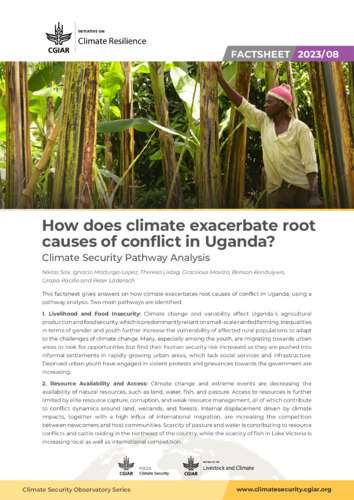How does climate exacerbate root causes of conflict in Uganda? Climate security pathway analysis
Abstract
This factsheet gives answers on how climate exacerbates root causes of conflict in Uganda, using an climate security pathway analysis. Two main climate security pathway are identified: 1. Livelihood and Food Insecurity: Climate change and variability affect Uganda ́s agricultural production and food security. Inequalities in terms of gender and youth further increase the vulnerability of affected rural populations to adapt to the challenges of climate change. Affected people are migrating towards urban areas, increasing human security risk in rapidly growing urban areas, which lack social services and infrastructure. Deprived urban youth have engaged in violent protests and grievances towards the government are increasing. 2. Resource Availability and Access: Climate change and extreme events are decreasing the availability of natural resources, such as land, water, fish, and pasture. Access to resources is further limited by elite resource capture, corruption, and weak resource management, all of which contribute to conflict dynamics around land, wetlands, and forests. Internal displacement driven by climate impacts, together with a high influx of international migration, are increasing the competition between newcomers and host communities. Scarcity of pasture and water is contributing to resource conflicts and cattle raiding in the northeast of the country, while the scarcity of fish in Lake Victoria is increasing local as well as international competition."

